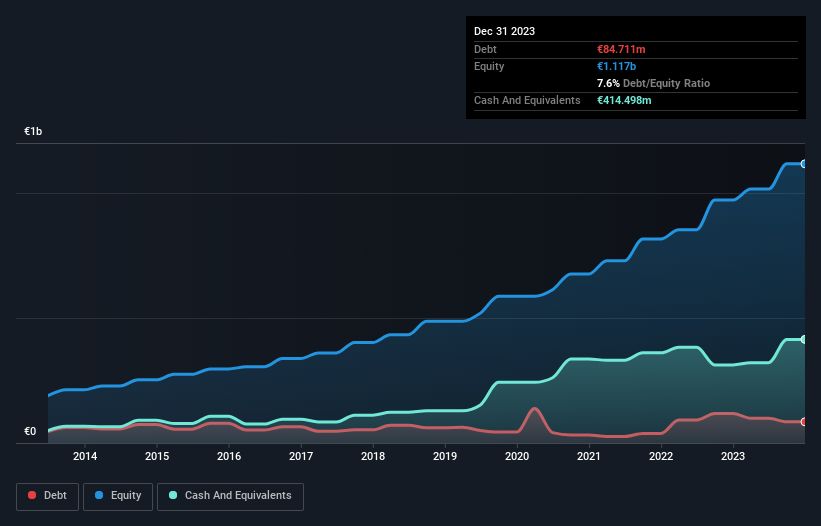Howard Marks put it nicely when he said that, rather than worrying about share price volatility, 'The possibility of permanent loss is the risk I worry about... and every practical investor I know worries about.' When we think about how risky a company is, we always like to look at its use of debt, since debt overload can lead to ruin. As with many other companies Reply S.p.A. (BIT:REY) makes use of debt. But should shareholders be worried about its use of debt?
What Risk Does Debt Bring?
Debt and other liabilities become risky for a business when it cannot easily fulfill those obligations, either with free cash flow or by raising capital at an attractive price. Ultimately, if the company can't fulfill its legal obligations to repay debt, shareholders could walk away with nothing. While that is not too common, we often do see indebted companies permanently diluting shareholders because lenders force them to raise capital at a distressed price. Having said that, the most common situation is where a company manages its debt reasonably well - and to its own advantage. When we think about a company's use of debt, we first look at cash and debt together.
View our latest analysis for Reply
How Much Debt Does Reply Carry?
You can click the graphic below for the historical numbers, but it shows that Reply had €84.7m of debt in December 2023, down from €117.6m, one year before. But it also has €414.5m in cash to offset that, meaning it has €329.8m net cash.

How Healthy Is Reply's Balance Sheet?
According to the last reported balance sheet, Reply had liabilities of €891.4m due within 12 months, and liabilities of €365.8m due beyond 12 months. Offsetting this, it had €414.5m in cash and €864.0m in receivables that were due within 12 months. So these liquid assets roughly match the total liabilities.
Having regard to Reply's size, it seems that its liquid assets are well balanced with its total liabilities. So while it's hard to imagine that the €5.09b company is struggling for cash, we still think it's worth monitoring its balance sheet. Simply put, the fact that Reply has more cash than debt is arguably a good indication that it can manage its debt safely.
Reply's EBIT was pretty flat over the last year, but that shouldn't be an issue given the it doesn't have a lot of debt. There's no doubt that we learn most about debt from the balance sheet. But ultimately the future profitability of the business will decide if Reply can strengthen its balance sheet over time. So if you're focused on the future you can check out this free report showing analyst profit forecasts.
Finally, a business needs free cash flow to pay off debt; accounting profits just don't cut it. While Reply has net cash on its balance sheet, it's still worth taking a look at its ability to convert earnings before interest and tax (EBIT) to free cash flow, to help us understand how quickly it is building (or eroding) that cash balance. During the last three years, Reply produced sturdy free cash flow equating to 69% of its EBIT, about what we'd expect. This cold hard cash means it can reduce its debt when it wants to.
Summing Up
While it is always sensible to investigate a company's debt, in this case Reply has €329.8m in net cash and a decent-looking balance sheet. And it impressed us with free cash flow of €221m, being 69% of its EBIT. So is Reply's debt a risk? It doesn't seem so to us. Over time, share prices tend to follow earnings per share, so if you're interested in Reply, you may well want to click here to check an interactive graph of its earnings per share history.
If you're interested in investing in businesses that can grow profits without the burden of debt, then check out this free list of growing businesses that have net cash on the balance sheet.
New: AI Stock Screener & Alerts
Our new AI Stock Screener scans the market every day to uncover opportunities.
• Dividend Powerhouses (3%+ Yield)
• Undervalued Small Caps with Insider Buying
• High growth Tech and AI Companies
Or build your own from over 50 metrics.
Have feedback on this article? Concerned about the content? Get in touch with us directly. Alternatively, email editorial-team (at) simplywallst.com.
This article by Simply Wall St is general in nature. We provide commentary based on historical data and analyst forecasts only using an unbiased methodology and our articles are not intended to be financial advice. It does not constitute a recommendation to buy or sell any stock, and does not take account of your objectives, or your financial situation. We aim to bring you long-term focused analysis driven by fundamental data. Note that our analysis may not factor in the latest price-sensitive company announcements or qualitative material. Simply Wall St has no position in any stocks mentioned.
About BIT:REY
Reply
Provides consulting, system integration, and digital services based on communication channels and digital media in Italy and internationally.
Outstanding track record with excellent balance sheet and pays a dividend.
Similar Companies
Market Insights
Community Narratives




